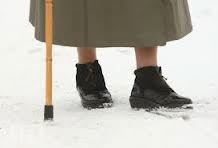
Preventing Falls for the Elderly
Top tips on how to avoid falls and a checklist to ensure your surroundings are as safe as possible... The Falls reduction project is run by East Lancashire NHS. The aim of the project is to reduce the number of falls in older people which result in serious injury or fracture and ensure effective treatment and rehabilitation for those who have fallen.
1. Exercise
Keep Your Body Active
You are more likely to fall if you have weak muscles and poor balance.
A good way to make your muscles stronger and to improve your balance is to take regular exercise – some activities are chair–based too.
Some good forms of physical exercise are:
Walking – try and build it in to your daily routine
Light gardening and housework
Keep fit and gentle exercise classes
T’ai Chi classes (check that the teacher has worked with older people before)
Regular exercise is also good for easing the pain and the swelling arthritis causes, massage is very good too.
2. Footwear
Watch what you wear
You are likely to slip or trip if you are wearing:
Slippers that are loose or have no back
Sandals
Shoes with heels
Flared trousers
Clothing that trails to the ground
Wear flat shoes or shoes with thin sloes or a built-in heel. Don’t wear trainers or shoes like trainers. And remember not to walk on slippery floors in socks or tights.
3. Vision
Wear the right glasses
Have your eyes tested regularly at least every two years. Eye tests are free to people over 60.
Do you need glasses for reading and for distance?
If you do, it is best to have two separate pairs of glasses. Bifocals or vari-focals are not as safe and take a bit of getting used to.
You may not need to pay the full amount for your glasses. Ask your optician for advice.
4. Medication
Keep steady
Do you have to take more than four kinds of medicine? If you do, ask your doctor or Pharmacist to check them regularly. Let your doctor know if your pills are making you feel dizzy.
Don’t drink alcohol when you are on medicine.
The mixture can make you dizzy and can cause you to lose your balance.
5. Lighting
Making your home safer
You can make small changes in your home and cut down accidents.
You could:
Put 100 watt light bulbs in the kitchen and stairways so they are brightly lit.
Use long-life bulbs so you do not have to change them so often .
Paint the outer edge of steps with non-slip white paint.
Have handrails by the toilet and bath and on the stairs.
Make carpets safer by repairing or removing any frayed edges.
When you go to the toilet at night, don’t use a torch. Turn on a light.
Hold on to something secure if you need to bend.
Top Tips for Avoiding Falls
Clear away things you can trip over
Make sure you have good lighting
Try and keep your home warm - it will help
Ask for a 12 month medicine review
Keeping yourself active will reduce your risk of falling
Look after your feet & wear sensible footwear
Have regular eye tests
Check and change walking stick rubbers (ferrules) if they are getting worn. You can obtain new ferrules from your local health centre.
For information on how to ensure that your home or surroundings will not contribute to a fall, and for more information on how to avoid falls, please view this excellent booklet put together by East Lancashire NHS.
"Don't Fall, Walk Tall" - Falls Accident Prevention Team booklet